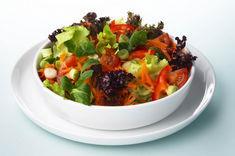
Growing uptake of prepared salads “will lead to increased food poisoning”, an eminent scientist said yesterday.
Gad Frankel, professor of molecular pathogenesis at Imperial College, London, told delegates at the Food Micro 2008 conference in Aberdeen that just because some labels claimed food was pre-washed did not necessarily make it safe to eat.
According to The Daily Telegraph, Frankel and his team have discovered how salmonella and E.coli germs - more commonly associated with chicken and bovine products - can spread to salad and vegetable leaves.
He was quoted in the newspaper: “In their efforts to eat healthily, people are eating more salad products, choosing to buy organic brands and preferring the ease of ‘pre-washed’ bagged salads from supermarkets, than ever before.
“All of these factors, together with the globalisation of the food market, mean that cases of salmonella and E.coli poisoning caused by salads are likely to rise in the future.
“This is why it’s important to get a head start with understanding how contamination occurs now.”
He told delegates that although there are many salads marketed as washed and ready to eat, consumers should be aware of the risks so they could make informed choices about whether to wash their food or not.
Research was carried out by Frankel with a team from Imperial College, as well as the University of Birmingham. It found that salmonella bacteria are able to latch onto salad leaves and contaminate them.
Scientists know that salmonella and E.coli 0157 - a strain that can cause serious sickness in humans - can spread to salads and vegetables if they are fertilised with contaminated manure or come into contact with contaminated products.
The scientists research showed for the first time that the bacteria uses its flagella, usually associated with movement of the organism, to hold onto the leaves.
Frankel said they would try to identify the factors that made some leaves less susceptible to salmonella to protect others from contamination in future.
“Discovering that the flagella play a key role in salmonella’s ability to contaminate salad leaves gives us a better understanding than ever before of how this contamination process occurs,” he was reported saying in the Telegraph. “Once we understand it, we can begin to work on ways of fighting it.”



